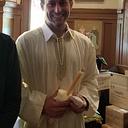Ihor’s Gambit: Ukraine’s Blueprint For Playing Both Sides Of The U.S.-Russia Conflict.
The Ukraine has seldom been the singular focus of American politics in the way that it has been in the fall of 2019. As House impeachment hearings of President Donald Trump continue, the country has been treated to a parade of diplomats from and specializing in the region. Formerly anonymous civil servants like Marie Yovanovitch, Lt. Col. Alexander Vindman, and Gordon Sondland have become household names. Media outlets are breathless with anticipation about the impact of each new testimonial. And yet, the news item about Ukraine from the past week that fascinated me the most was one only tangentially related to the impeachment of Donald Trump.
The story in question appeared in the New York Times one week ago, and it concerns the man who, though he has (as far as we know) never been offered a quid pro quo by Donald Trump over a phone call, may in fact be the most important man in Ukraine right now. That man is Ihor Kolomoisky, one of Ukraine’s most powerful and most notorious oligarchs. As has been detailed in many sources including the Times article, Kolomoisky owns the television network that carried Ukranian President Zelensky’s television series, Servant of the People, which launched his meteoric rise to the top of Ukrainian politics. Zelensky has fervently denied this claim and in the article Kolomoisky downplays it, but the fact that Kolomoisky felt safe enough to return to Ukrainian soil following his election (he had fled the country after Zelensky’s predecessor nationalized his bank, the largest in Ukraine) would speak louder than whatever words anyone could offer on the subject.
Kolomoisky, as he all but outright admits in the article, is a man of purely mercenary spirit, who will take any position, or any action, if it results in him coming out on top in the end. During the conflict between Ukraine and Russian-backed separatists, Kolomoisky was willing to do anything to ensure his side would win- that side being, for that moment, the pro-western one. Kolomoisky is Jewish, holds Israeli citizenship in addition to his Ukrainian one, and was at one time the President of the European Council of Jewish Communities. Yet none of the above facts stopped him from funding neo-Nazi militias in Ukraine, particulary the infamous Azov Battalion, so long as they were opposed to Russia (and kept Kolomoisky-owned properties from being looted).
A major criticism I would have of the article is that it uncritically portrays Kolomoisky as pushing back against the Kremlin-advanced idea of neo-Nazi influence in the post-Maidan Ukraine. While Russia has certainly used the “Nazi Ukraine” meme in its discourse and propaganda, Kolomoisky’s links to Azov have been reported independently in sources including Israeli media, and Kolomoisky himself has been photographed wearing a t shirt that translates to “Judeobanderist,” referring to Stepan Bandera, a Ukrainian nationalist who collaborated with the Nazis in WWII.
If confronted by this and unable to deny it, Kolomoisky would in the past surely have justified it by saying that it was necessary to defend Ukraine from Russia’s encroachment on its sovereignty. And yet, in the Times article he has made a complete about face on this position as well. In extremely blunt terms, he now says that the time has now come for Ukraine to turn its back on the West and ally with Russia once more. Although he still insists that he is not personally pro-Russsian, he says that the West has not lived up to its promises made to the Ukraine post-Maidan, and that Russia would not hold back on giving Ukraine the aid money that the I.M.F. has held off on giving, in part citing concerns about Kolomoisky’s influence in Kiev.
What does Kolomoisky hope to achieve by doing this? I strongly suspect his ultimate goal is to be Vladimir Putin’s best friend. I do think that the resentment of the U.S. that Kolomoisky (and possibly Zelensky as well) feel towards the U.S. However, I can see how they would think that in the wake of the conflict in the Donbass, the West has taken Ukraine’s allegiance for granted, as it would be unthinkable, impossible, for a rapprochement with Russia to occur. And yet, Zelensky’s election, where he defeated the incumbent President with an overwhelming electoral mandate, can only have represented a dissatisfaction with the post-Maidan status quo.
While Zelensky has been insistent that he will continue Ukraine’s overall pro-Western trajectory, he has attempted to strike a more independent posture on foreign policy. He has recently expressed openness to the idea of meeting with Vladimir Putin without Western leaders present, which would have been unthinkable under the previous administration. He has also distanced himself as much as possible from the Trump-Ukraine impeachment saga despite being a central player in it, brusquely dismissing questions from CNN about it.
The ultimate goal for these men, if they are indeed working in tandem, is for Ukraine to remain allied with the West, but in a stronger position, with greater concessions and more leverage than existed previously. They likely anticipate a strongly anti-Russian President to be the next occupant of the White House, and Ukrainian support will be more important than ever to advance a harsh line towards the Kremlin. The possibility of a rapprochement with Russia is to be used as a stalking horse to achieve this end. The next President, whoever he or she may be, would do well to tread carefully when dealing with someone like Kolomoisky- the situation the U.S. finds itself in with regards to Turkey, a longtime NATO ally whose unscrupulous behavior was ignored until it can now effortlessly play Washington off against Moscow to its own benefit, is pertinent here. The trend here may be that Ukraine under Kolomoisky and Zelensky becomes, like Turkey or Saudi Arabia, a problematic ally that one cannot live with or live without, if it is not already.
